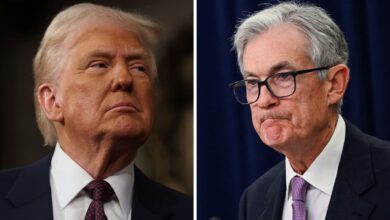From Mama June’s Café to Your Wallet: How the U.S. Leaving the NGFS Could Impact Your Financial Future

Juniper Thompson or “Mama June” as she is known never thought climate change would affect her small café in Tampa, Florida. She wasn’t worried about rising sea levels or carbon emissions—she was worried about her customers, her coffee supplier, and whether her old espresso machine would survive another busy weekend.
But after Hurricane Idalia swept through last year, leaving her café flooded and closed for weeks, her flood insurance premiums doubled. She’s now paying more for insurance than she does for her monthly rent. “It’s not like I suddenly moved to the oceanfront,” she jokes. “The only thing that changed is how risky insurance companies think my café is.”
What Mamma June doesn’t realize—and what many Americans don’t—is that decisions made thousands of miles away in Washington, D.C., can ripple down to her café’s bottom line. One of those decisions happened quietly on January 30, 2025, when the U.S. Department of the Treasury announced its withdrawal from the Network of Central Banks and Supervisors for Greening the Financial System (NGFS).
It didn’t make major headlines. But it could make a major difference in Mama June’s life—and yours.
What Is the NGFS, and Why Should You Care?
The Network of Central Banks and Supervisors for Greening the Financial System (NGFS) is a global coalition of central banks and financial regulators. Its job? To help countries prepare for financial risks caused by climate change—whether that’s a hurricane wiping out homes, wildfires disrupting supply chains, or rising temperatures affecting food production.
Think of it like this: if the global economy were a ship, the NGFS is part of the crew scanning the horizon for icebergs. It helps countries spot risks early and adjust course before disaster strikes.
The U.S. was part of that crew—until now.
Why Did the U.S. Leave?
The Trump administration’s reasoning is simple: they believe climate-related financial policies create unnecessary red tape for American businesses. Their focus is on boosting economic growth, especially in traditional industries like oil, gas, and manufacturing. In their view, worrying about climate risks slows things down.
But here’s the catch: ignoring risks doesn’t make them disappear. It just makes us less prepared when they hit.
How Does This Affect You?
This isn’t just about climate change. It’s about your money, your job, and your financial security.
Let’s go from Juniper’s café to the bigger picture.
1. Rising Insurance Costs
After Hurricane Idalia, June’s insurance company recalculated the risk of doing business in her neighborhood. Higher risk = higher premiums.
The NGFS helps financial institutions predict and manage these risks. Without U.S. participation, there’s less guidance on how to stabilize insurance markets, which could mean higher costs for homeowners, renters, and small business owners across the country—not just in coastal areas.
2. Job Uncertainty in Emerging Industries
Meet Jamal Davis, an electrical engineer from Detroit who recently landed a job at a company developing solar energy technology. Jamal thought he’d found a career with growth potential. But now, with the U.S. pulling back from global climate finance networks like the NGFS, investment in green industries could slow down.
That means fewer jobs in renewable energy, sustainable agriculture, and green tech—industries that were projected to create millions of new jobs globally. For workers like Jamal, this isn’t just policy talk. It’s about job security.
3. Volatile Energy Prices
Consider Maria Lopez, a single mom in Texas who commutes 40 miles to work every day. Gas prices have been a rollercoaster lately—one week they’re down, the next they’re up 50 cents per gallon.
The NGFS helps countries coordinate strategies to stabilize energy markets as the world shifts from fossil fuels to renewable energy. Without that collaboration, energy prices could become even more unpredictable, affecting not just your gas bill but also the price of groceries, utilities, and just about everything else.
4. Risks to Your Savings and Retirement
And then there’s David Chen, a retired teacher in Oregon living on a fixed income. His retirement savings are tied up in mutual funds, and he relies on that money to cover his living expenses. Sudden shocks to the financial system—like a climate-related disaster that tanks the stock market—could wipe out a chunk of his savings.
The NGFS helps identify these risks early, so financial systems can adjust before they snowball into crises. Without that early warning system, your investments could be more vulnerable to unexpected downturns.
The Bigger Picture: Why This Matters
When the U.S. pulls out of global financial networks like the NGFS, it’s not just stepping away from climate policy. It’s stepping away from global cooperation designed to keep economies stable.
This could lead to:
- Higher insurance costs for homes, businesses, and cars
- Less stable job markets, especially in industries tied to clean energy
- More volatile prices for energy, food, and everyday goods
- Increased financial risks for savings, investments, and retirement funds
In other words, the cost of inaction isn’t just environmental—it’s economic.
What Can You Do?
While you can’t change federal policy overnight, you’re not powerless:
- Stay informed. Understanding how global decisions affect your finances helps you make smarter choices.
- Diversify your investments. Look into funds that are resilient to climate-related risks.
- Support local resilience. Advocate for community programs that invest in sustainable infrastructure and disaster preparedness.
The Bottom Line
When the U.S. left the NGFS, it wasn’t just stepping back from a climate conversation—it was stepping back from a plan to protect the financial future of people like Mama June, Jamal, Maria, and David.
It’s easy to ignore policies that feel distant or technical. But global decisions have local consequences—on your insurance bill, your job security, and the money in your bank account.
Because whether it’s a hurricane in Florida, a gas spike in Texas, or a retirement fund in Oregon, the economy isn’t some abstract thing. It’s your life. – All subjects are fictional characters





